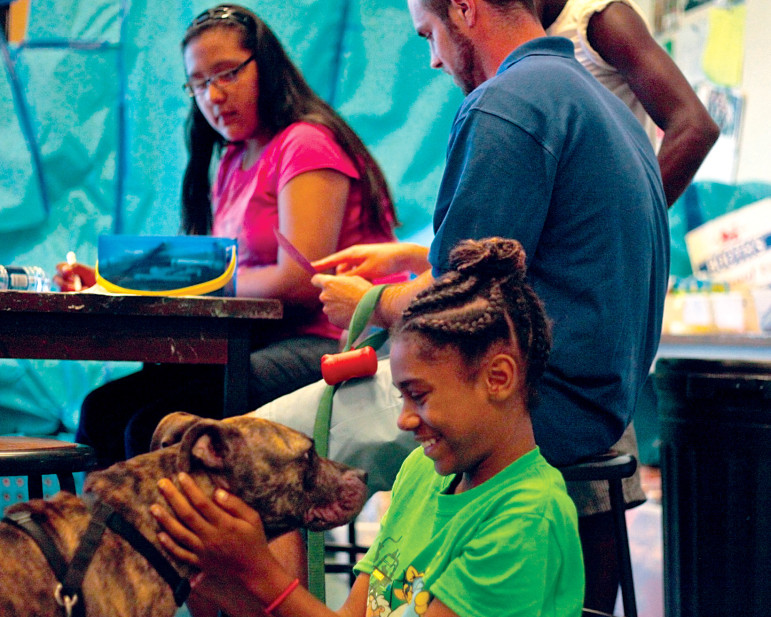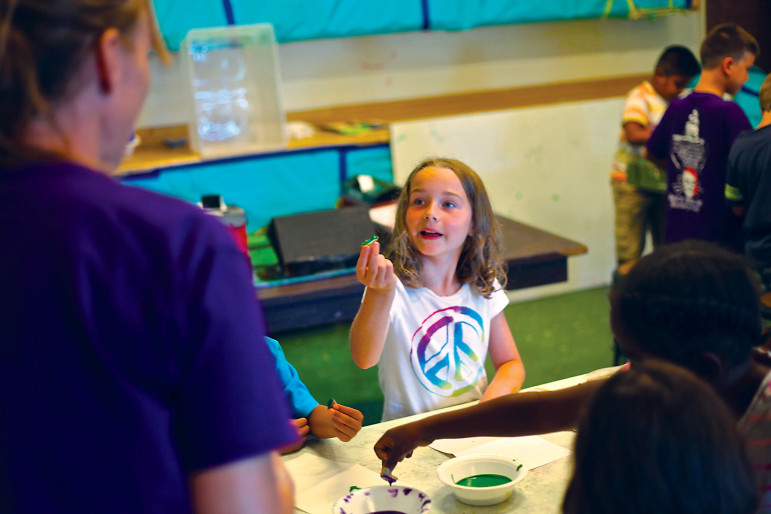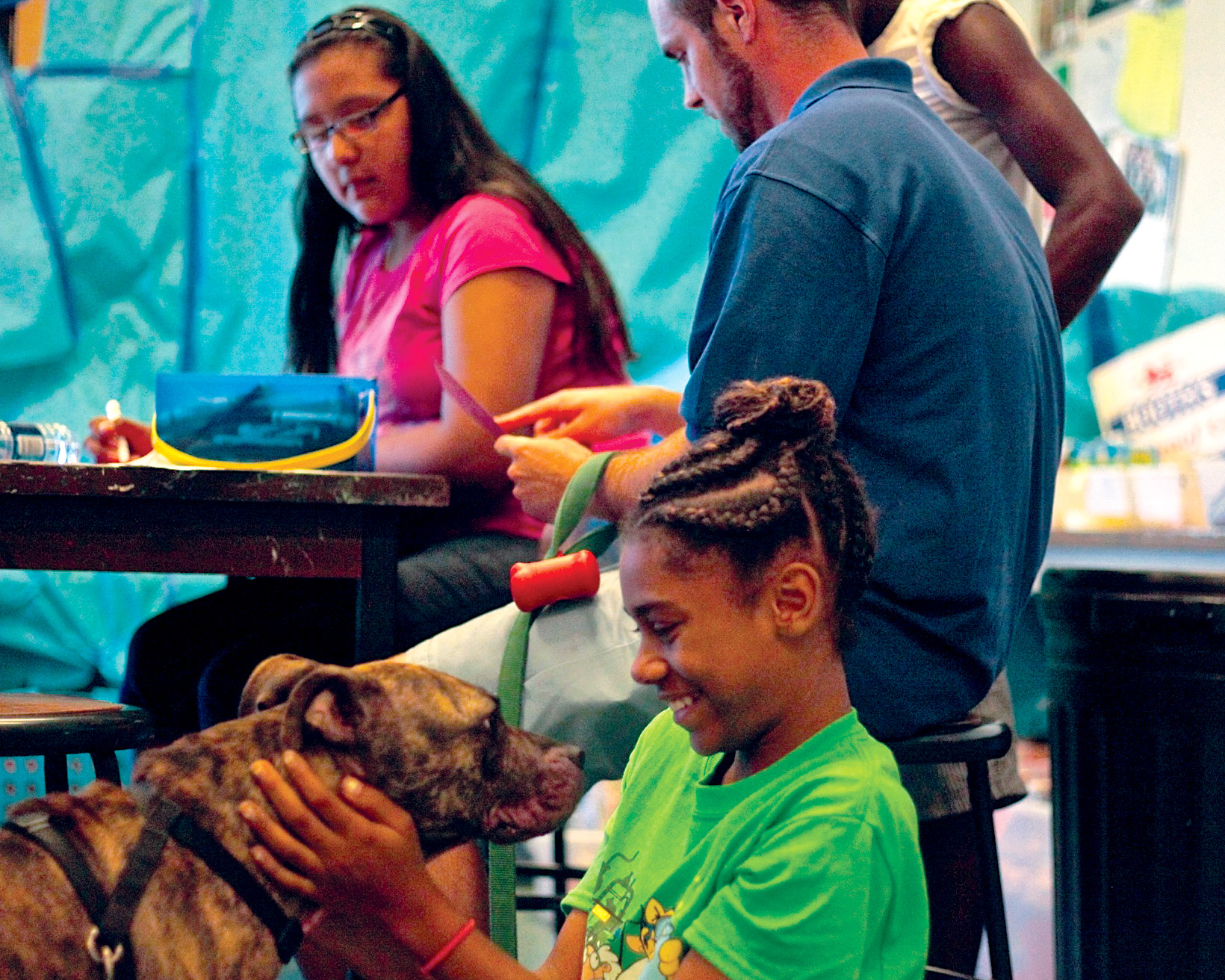
Photos courtesy of Horizons
Horizons student Niya plays with Ollala, her teacher’s dog, who helped star in the children’s PSA for the local humane society, created as part of a hands-on learning activity during the summer program.
CHESTERTOWN, Md. — Jack the Beagle proved a big hit in Randy Decker’s fourth-grade class.
Decker’s students loved reading to the dog, one of several from the Kent County Humane Society that came to the Horizons of Kent County summer learning program, run out of the private Radcliffe Creek School in this historic colonial town on Maryland’s Eastern Shore.
Decker, who arranged for the weekly visits with the Humane Society, knows his students are much less self-conscious when reading to a dog than reading aloud in front of the whole class.
Most importantly, it gets the kids reading — and looking forward to doing so.
The dogs’ visits are just one of the many innovative teaching techniques at Horizons, where students start as early as pre-kindergarten and about 85 percent of them return every summer through eighth grade. (The Chestertown program is adding ninth grade this summer and plans to expand to all high school students in the coming years.)
The 110 low-income public-school students in the free program here not only avoid the “summer learning loss” or “summer slide” typical among poor children, but even make significant gains in reading and math. (See sidebar.)
At the Chestertown program, as in all affiliates — at least 42 planned for this summer — of the nonprofit Horizons National, based in Westport, Conn., learning masquerades as fun.
Horizons’ project-based classroom learning is complemented by a panoply of enrichment and cultural activities. In Chestertown, students venture out on sailing expeditions on the Chesapeake Bay, tour college campuses and learn about pursuing higher education (including financial aid), and take weekly field trips — like visits to museums, historic sites and nature centers.
The idea is to enrich low-income kids with the kinds of educational, cultural and social opportunities higher-income families are able to provide their children during the summer.
“We make a commitment to children from the minute they enter our program all the way through the eighth grade,” said Jose Oromi, chief program officer at Horizons National. “So it’s not just about a single summer of magic. It’s this continuous repetition of coming back every summer to this very special place that helps children.
“Summertime is, unfortunately, a time when a lot of low-income kids don’t have access to the resources and educational opportunities, and that contributes heavily to the achievement gap, which contributes heavily to the opportunity gap and a lot of our issues that contribute to poverty.”
Local approaches with national support

Horizons student Emma gets instructions from her teacher for an arts and crafts activity. The children took a field trip to the local beach where they gathered shells to paint with.
Horizons – which started with one program in New Canaan, Conn., in 1964 (a year before Head Start began as a summer program for low-income children) — has yielded impressive academic results. Standardized tests show Horizons participants gain an average of two to three months in reading and math achievement during each six-week summer session. By contrast, Horizons officials say national research (published by the National Summer Learning Association) reveals low-income children can lose an average of two to three months each summer in reading and math.
Today, Horizons National works with local affiliates, serving a projected 4,000 young people this summer, and the affiliates partner with independent schools or colleges that provide the space for each summer program.
The national nonprofit receives funding from foundations, including the Wallace Foundation and the W.K. Kellogg Foundation, and provides seed money, training and guidelines, evaluation resources, program quality site visits and funds for a reading specialist or program growth at each of the local Horizons affiliates. Beyond that, the local affiliates are self-sustaining.
The Chestertown program, for example, relies on funding from area foundations, donations from individuals and special events, and is governed by a local board of directors.
For Horizons National, starting a local affiliate amounts to a long-term commitment to the affiliate and to children, Oromi explained.
“When we enter a community, we have this idea that at the very least we’re making a commitment to a group of kindergartners for nine years,” he said. “Well, every single year, we bring in a new class of kindergartners, and we renew that commitment.
“So essentially, we want to make sure our program exists in perpetuity, and that requires time and patience and a lot of deliberateness in making sure that all the right ingredients and resources are there to fulfill that mission. So we have to be patient. We’re conscious that success isn’t defined by a single year. Success is defined by what happens a decade or two later.”
On average, Oromi said, it costs $2,000 to $2,500 per student to run a Horizons program, depending on program location and size. In addition to the full-day, six-week summer session, “all programs are required to provide a school-year connection to their students, which typically is Saturday programming, but may include special events or after-school sessions. In addition, all programs also have families initiatives to help provide students with more educational support at home.”
Diving in the deep end
In Chestertown, as in Horizons programs nationwide, success is defined not only by gains in the classroom, but also by learning to swim.
It’s a hallmark of every Horizons program and a favorite among kids, who head to a huge new pool at the Kent County Community Center for two hours three mornings per week — two sessions for instruction, a third for a recreational free swim. And their teachers get in the water with the children.
Many of the kids enter Chestertown program unable to swim, even though the largely rural Kent County is practically surrounded by the waters of the Chesapeake Bay and its tributaries. The children receive a medal when, with the help of an American Red Cross-certified swimming instructor, they master skills to the point that that they’re allowed to swim in the 13-foot deep end and jump off the diving board. The moment never fails to thrill.
Swimming is designed to foster self-discipline, boost the children’s confidence that they can master new challenges, inside the classroom and out — and also to improve math skills: They race and measure times and distances.
[module type=”aside” align=”right”]
“It takes a long time to build really good reading skills, but here, sometimes in just a few minutes, they realize they can float. And it’s the most remarkable thing that they realize that they can build these skills sometimes in just a few seconds. It’s an enormous confidence-builder.”
Margie Ellsberg, Horizon Chestertown, swimming instructor
[/module]
“So many of these kids have trouble learning to read and trouble reading, so it’s hard to see from day to day how much progress they’re making,” said Margie Ellsberg, Chestertown’s 71-year-old swimming instructor. “It takes a long time to build really good reading skills, but here, sometimes in just a few minutes, they realize they can float. And it’s the most remarkable thing that they realize that they can build these skills sometimes in just a few seconds. It’s an enormous confidence-builder.”
So is reading to the dogs in Randy Decker’s class.
Decker, who teaches during the school year at a high school in suburban Washington, D.C., recalls one boy with a speech impediment at the Horizons program.
“It seemed like he just kind of forgot that he had that speech impediment, and his fluency just kept improving the longer I had him reading with the dog,” Decker said. “Interestingly enough, as soon as he stopped reading to the dog and had to communicate with me, he would get back to stuttering and had a reading impairment that way.”
The students spend roughly two hours per day in traditional classes focusing on subjects including reading, writing and math on weekdays, from 9 a.m. to 3 p.m.
Class sizes are small — with a 1:5 staff-to-student ratio. Oromi said the typical classroom is made up of 15 students with an experienced master teacher, a teaching assistant (usually a master’s in education candidate or recent graduate), and a classroom intern (college or older high school student). And all programs have at least one reading specialist.
One July afternoon, Decker gently walked his fourth-grade charges through rewriting thank-you letters, in this case to the Kent County Humane Society, for volunteering to bring the dogs.

Horizons student Johnny writes a thank you letter to the local Humane Society for bringing dogs in that the children read to.
“So, I looked at your thank-you letters, and I felt that they were genuine, they were heartfelt, they were a good attempt, but I learned that you don’t know how to write a thank-you letter,” he told his students.
“What?” one student retorted. “I do!”
“I’m going to take a minute now to help you with that, OK?” Decker continued.
He began with the addressee and the salutation. “So, what besides ‘the pound’ is the proper name?”
“The Humane Society of Kent County,” one student replied.
When some children dawdle a bit, he urged: “I need that letter. I need that letter. Start: ‘Dear Humane Society of Kent County.’”
Mix of students — by design
Decker and other staff here — and at all Horizons programs — work with students with a broad range of achievement levels: one-third of them at grade level, one-third above grade level and one-third below grade level, and all the students are recommended by guidance counselors at their public schools who believe they would benefit from Horizons. The mix of students at different levels is meant to enable higher achievers to inspire and help lower achievers.
Whatever their performance in school, all the children are impoverished. They’re all eligible for free or reduced-price school lunches, and their annual family incomes are less than $24,000, said Bob Parks, executive director of the Chestertown program.
Many of the children also deal with dysfunction and other challenges at home, Parks said. There’s the Chestertown boy who lives with his grandfather and whose father and brother are drug dealers. A girl from Rock Hall, a nearby community on the Chesapeake, refuses to visit her parents, both of whom are in jail, and lives with her aunt. A Chestertown boy lives with his grandmother because his parents “didn’t want him,” Parks said.
This summer, he said, the local Horizons affiliate hopes to hire a counselor to help kids cope with such issues.
Horizons provides a haven and a wholesome alternative to what many of the children may be doing otherwise during the long summer months.
“These kids would be hanging around the streets or sitting around and watching TV,” Parks said. “So, this is not only giving them academics so they don’t slide when the new year starts, but also giving them enrichment.” (See Summer Learning Loss sidebar.)
Last summer, middle school students visited Washington College, a prestigious liberal arts school in town that regularly works closely with Horizons, to research nonprofits and learn about advertising, public service and collaboration by creating and filming a public-service announcement for several organizations, including: Kent County Humane Society (using a teacher’s dog, adopted from there), the Salvation Army, the Boy Scouts, Horizons and Helping Our Youth Achieve Success, which works with Kent County males ages 11 to 17.
Students also visited the Smithsonian Institution National Museum of American History and the Newseum in Washington, D.C.
Younger students headed to downtown Chestertown, where they got to meet Mayor Chris Cerino, and they visited the upscale Imperial Hotel, Stam Drug pharmacy, a historic theater and Cliff’s Schoolhouse southeast of Chestertown, a one-room schoolhouse that admitted only white children when it was open from 1878 to 1939. The youngsters also visited a Herr Foods factory in Nottingham, Pa., where they saw potato chips being made, as well as a zoo, a firehouse, a beef cattle farm and a dairy farm.
All the students joined afternoon enrichment clubs, in addition to their academic pursuits.
[module type=”aside” align=”right”]“Summertime is, unfortunately, a time when a lot of low-income kids don’t have access to the resources and educational opportunities, and that contributes heavily to the achievement gap, which contributes heavily to the opportunity gap and a lot of our issues that contribute to poverty.”
Jose Oromi, Horizons National chief program officer
[/module]In one, they built scale models of the nearly 18-mile-long Chesapeake Bay Bridge-Tunnel, the Sydney (Australia) Harbour Bridge and the London Eye using K’NEX. (Unbeknownst to the students, they learned a whole lot about engineering in the process.) Other enrichment clubs focused on cooking, computers, music, and arts and crafts.
At the Kent County Community Center, students marveled at a small drone — with four spindly legs, built by a senior web designer at Washington College — as it soared about 125 feet into the air and took their photos from a camera onboard.
The Rock Hall Yacht Club Sailing School on the Chesapeake provided free lessons to fourth-graders, who learned to sail independently aboard small Sunfish sailboats and Hobie Cat catamarans.
Middle school students kayaked along Turner’s Creek and canoed the Sassafras River, both tributaries of the Chesapeake, and studied ecosystems.
A few dozen Horizons kids, along with other locals, also got a taste of Broadway, performing in “Showstoppers,” a musical staged by Broadway producer Mark Bramble, who grew up in Chestertown and now splits his time between New York City and his birthplace. About 250 guests, including Horizons kids, took in the July show, last year’s annual fundraiser, at the Decker Theatre on the campus of Washington College.
Horizons strives to keep family members engaged through the fundraiser, an orientation, communication with staff during the six-week session, workshops, visits to several college campuses and an awards ceremony recognizing kids’ accomplishments.
‘Like educational day camp’
Parents and their children had high praise for Horizons.
Jamie Foote, the mother of Alexandria, a seventh-grader in her second year at Horizons last July, said her daughter has made big strides academically.
“Before she got in the program, she was way behind in her reading and math; her levels were two grades below everybody else,” said the mother, who works for Kent County government as a parks and recreation department facilities supervisor.
Now, Alexandria (who goes by “Allie”) is up to grade level in reading and a bit ahead in math.
The program also helped Allie socially, her mother said: “She is very shy and doesn’t like to venture outside the box to meet people. And at Horizons, she comes home every day with a new friend and just absolutely loves it, and she actually interacts there.”
This coming summer, Allie’s little brother, John, will begin attending Horizons, too. (Horizons gives siblings of students preference in admissions, as part of its effort to foster family engagement.)
For her part, Allie said, “It was much different than being stuck at home all the time.”
She enjoyed doing research in the Washington College library and computer lab, and visiting the Museum of American History, especially seeing the gowns of presidents’ wives.
Allie reached level 4 in swimming, allowing her to go in the deep end after she overcame a persistent fear that she wouldn’t be able to breathe in water 13 feet deep. “I was just told, ‘Don’t fear it,’” she said.
Gretchen Stroh, the mother of Zachary, an honors student who was a rising sixth grader last summer and who has attended Horizons since third grade, said she likes Horizons’ strict attendance policy – miss too many days, and you’re out of the program for good – and the fact that students are required to sign a contract saying they’ll live up to the program’s behavioral standards.
“They want you to make the same commitment to them that they are making to the child,” she said.
As for her son, she said he describes Horizons this way: “You know, it’s not like school. It’s more like educational day camp.”
See sidebar “Why Do Low-Income Kids Suffer So Much Summer Learning Loss?”
How To Stem Summer Slide
Leaders at Horizons National suggest these tips for any summer program aiming to stop the summer slide:
- Learn all you can about summer learning loss and ways to prevent it. Excellent sources of research on the subject include the National Summer Learning Association (summerlearning.org) and The Campaign for Grade-Level Reading (gradelevelreading.net).
- Think long-term. It’s not about a single summer. If children are falling behind, you need to provide consistent help during several summers to help them catch up and retain their learning.
- Forge partnerships with community groups, including funding sources and local schools, as well as families and other stakeholders to ensure quality and long-term sustainability.
- Mix the academics with enrichment and fun. Horizons’ full-day program, for example, includes academics, swimming, cultural programming (arts, music, dance, etc.) and field trips.
- Rely on small-group instruction. Horizons has a 1:5 staff-student ratio, which enables teachers and teaching assistants to provide individualized instruction.
- Consult with staff at students’ regular schools and with parents about the children’s performance and development, including strengths, weaknesses and areas to focus on in the summer program. Apply this information to ensure each child’s needs are met during the summer program and, when necessary, provide customized instruction.
SOURCE: Horizons National

























